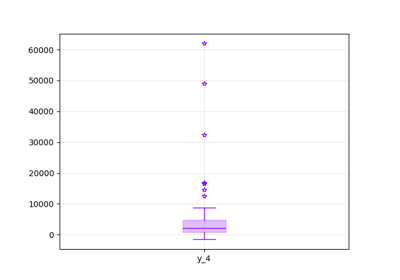empirical module¶
Class for the empirical estimation of statistics from a dataset.
Overview¶
The EmpiricalStatistics class inherits
from the abstract BaseStatistics class
and aims to estimate statistics from a Dataset,
based on empirical estimators.
Construction¶
A EmpiricalStatistics is built from a Dataset
and optionally variables names.
In this case,
statistics are only computed for these variables.
Otherwise,
statistics are computed for all the variable available in the dataset.
Lastly,
the user can give a name to its EmpiricalStatistics object.
By default,
this name is the concatenation of ‘EmpiricalStatistics’
and the name of the Dataset.
- class gemseo.uncertainty.statistics.empirical.EmpiricalStatistics(dataset, variable_names=(), name='')[source]
Bases:
BaseStatisticsA toolbox to compute statistics empirically.
Unless otherwise stated, the statistics are computed variable-wise and component-wise, i.e. variable-by-variable and component-by-component. So, for the sake of readability, the methods named as
compute_statistic()returndict[str, ndarray]objects whose values are the names of the variables and the values are the statistic estimated for the different component.Examples
>>> from gemseo import ( ... create_discipline, ... create_parameter_space, ... create_scenario, ... ) >>> from gemseo.uncertainty.statistics.empirical import EmpiricalStatistics >>> >>> expressions = {"y1": "x1+2*x2", "y2": "x1-3*x2"} >>> discipline = create_discipline( ... "AnalyticDiscipline", expressions=expressions ... ) >>> >>> parameter_space = create_parameter_space() >>> parameter_space.add_random_variable( ... "x1", "OTUniformDistribution", minimum=-1, maximum=1 ... ) >>> parameter_space.add_random_variable( ... "x2", "OTUniformDistribution", minimum=-1, maximum=1 ... ) >>> >>> scenario = create_scenario( ... [discipline], ... "DisciplinaryOpt", ... "y1", ... parameter_space, ... scenario_type="DOE", ... ) >>> scenario.execute({"algo": "OT_MONTE_CARLO", "n_samples": 100}) >>> >>> dataset = scenario.to_dataset(opt_naming=False) >>> >>> statistics = EmpiricalStatistics(dataset) >>> mean = statistics.compute_mean()
- Parameters:
dataset (Dataset) – A dataset.
variable_names (Iterable[str]) –
The names of the variables for which to compute statistics. If empty, consider all the variables of the dataset.
By default it is set to ().
name (str) –
A name for the toolbox computing statistics. If empty, concatenate the names of the dataset and the name of the class.
By default it is set to “”.
- compute_joint_probability(thresh, greater=True)[source]
Compute the joint probability related to a threshold.
Either \(\mathbb{P}[X \geq x]\) or \(\mathbb{P}[X \leq x]\).
- Parameters:
- Returns:
The joint probability of the different variables (by definition of the joint probability, this statistics is not computed component-wise).
- Return type:
- compute_maximum()[source]
Compute the maximum \(\text{Max}[X]\).
- compute_mean()[source]
Compute the mean \(\mathbb{E}[X]\).
- compute_minimum()[source]
Compute the \(\text{Min}[X]\).
- compute_moment(order)[source]
Compute the n-th moment \(M[X; n]\).
- compute_probability(thresh, greater=True)[source]
Compute the probability related to a threshold.
Either \(\mathbb{P}[X \geq x]\) or \(\mathbb{P}[X \leq x]\).
- Parameters:
- Returns:
The component-wise probability of the different variables.
- Return type:
- compute_quantile(prob)[source]
Compute the quantile \(\mathbb{Q}[X; \alpha]\) related to a probability.
- compute_range()[source]
Compute the range \(R[X]\).
- compute_standard_deviation()[source]
Compute the standard deviation \(\mathbb{S}[X]\).
- compute_variance()[source]
Compute the variance \(\mathbb{V}[X]\).
- plot_boxplot(save=False, show=True, directory_path='', file_format='png', **options)[source]
Visualize the data with a boxplot.
- Parameters:
save (bool) –
Whether to save the figures.
By default it is set to False.
show (bool) –
Whether to show the figures.
By default it is set to True.
directory_path (str | Path) –
The path to save the figures.
By default it is set to “”.
file_format (str) –
The file extension.
By default it is set to “png”.
**options (Any) – The options of the
Boxplotgraphs.
- Returns:
The boxplot of each variable.
- Return type:
- plot_cdf(save=False, show=True, directory_path='', file_format='png', **options)[source]
Visualize the empirical cumulative probability function.
- Parameters:
save (bool) –
Whether to save the figures.
By default it is set to False.
show (bool) –
Whether to show the figures.
By default it is set to True.
directory_path (str | Path) –
The path to save the figures.
By default it is set to “”.
file_format (str) –
The file extension.
By default it is set to “png”.
**options (Any) – The options of the
Linesgraphs.
- Returns:
The graph of the cumulative probability function for each variable.
- Return type:
- plot_pdf(save=False, show=True, directory_path='', file_format='png', **options)[source]
Visualize the empirical probability density function.
- Parameters:
save (bool) –
Whether to save the figures.
By default it is set to False.
show (bool) –
Whether to show the figures.
By default it is set to True.
directory_path (str | Path) –
The path to save the figures.
By default it is set to “”.
file_format (str) –
The file extension.
By default it is set to “png”.
**options (Any) – The options of the
Linesgraphs.
- Returns:
The graph of the probability density function for each variable.
- Return type:
- dataset: Dataset
The dataset.
- n_samples: int
The number of samples.
- n_variables: int
The number of variables.
- name: str
The name of the object.

